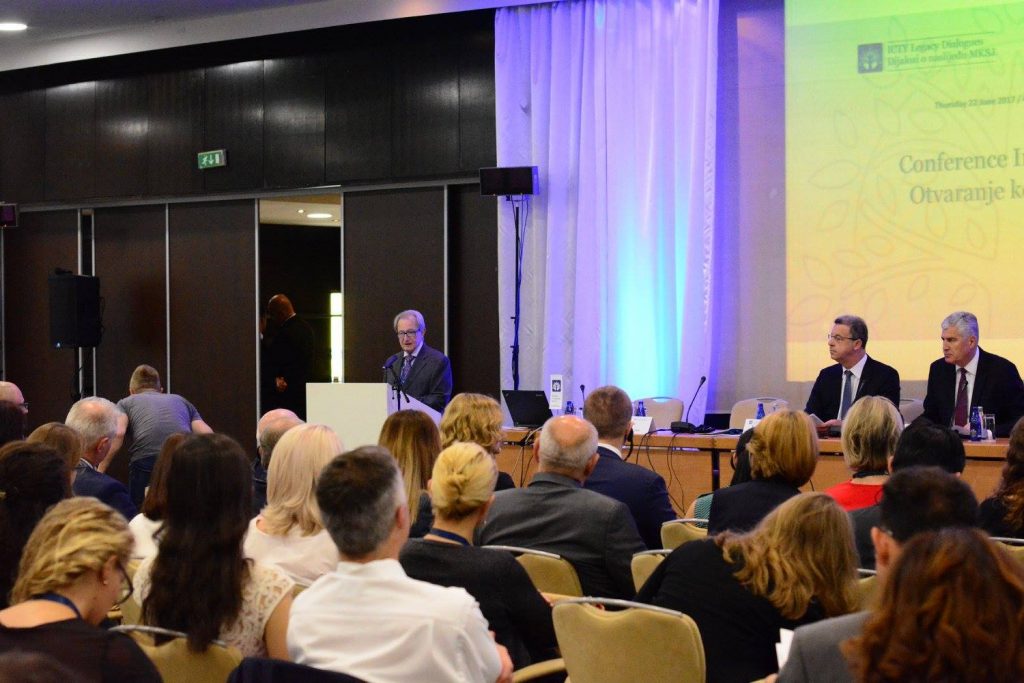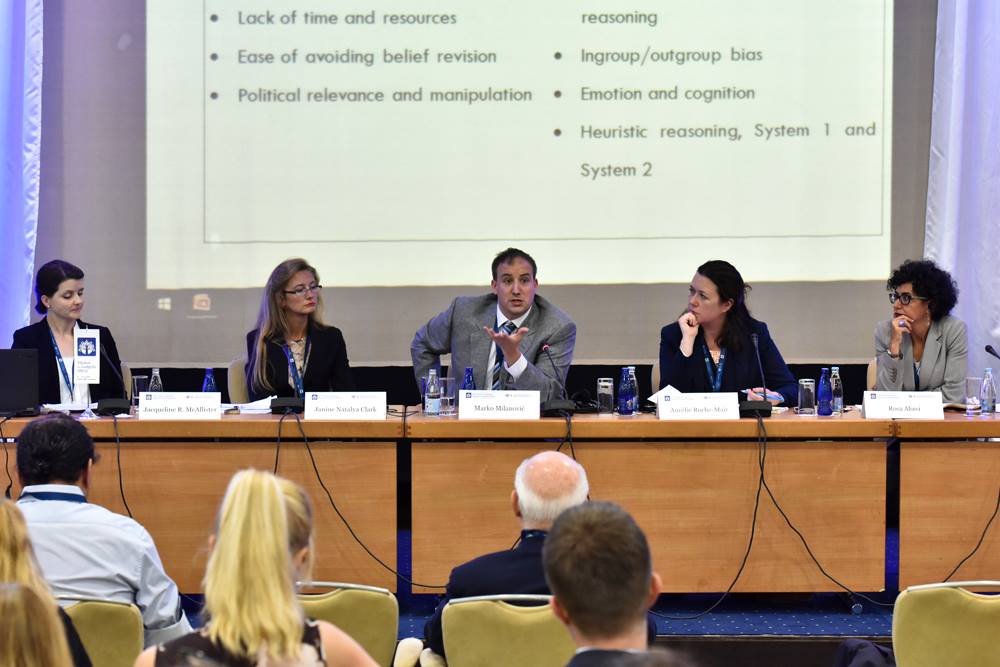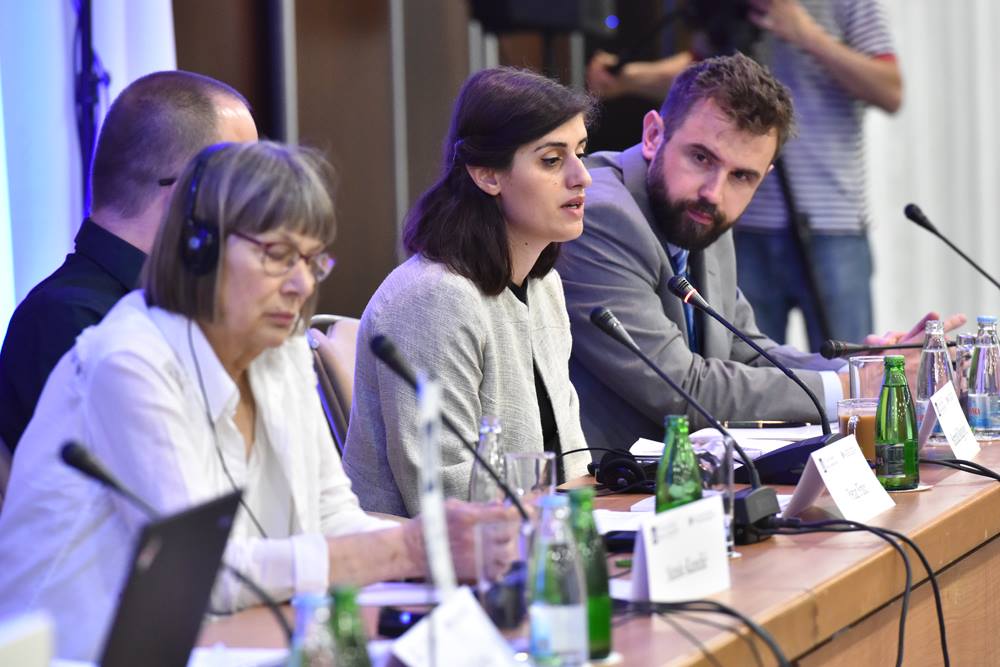
The ICTY is getting ready to close its doors permanently in 2017. During their 24 arduous years, the ICTY prosecuted over 160 of those responsible for serious violations of international humanitarian law during the Yugoslav wars of the 1990s.
The International Criminal Tribunal for the former Yugoslavia (ICTY) is getting ready to close its doors permanently in 2017. During their 24 arduous years, the ICTY prosecuted over 160 of those responsible for serious violations of international humanitarian law during the Yugoslav wars of the 1990s.
The Post-Conflict Research Center (PCRC) attended the ‘ICTY Legacy Dialogues Conference’ from 22 to 24 June in Sarajevo to hear perspectives on the legacy the ICTY will leave behind, and recap the pioneering work the ICTY has done in international humanitarian and criminal law. PCRC also had the chance to present its own work on restoring a culture of peace in the Western Balkans.
In the article that follows, PCRC staff present highlights from the three days of conference programming.
Marko Milanović (University of Nottingham) – Discussion on Non-Judicial Legacy
Milanović boldly stated that despite the hard work of the ICTY, there is an ethnic bias against acceptance of crimes; communities tend to believe certain facts when they suit them. Facts do not help convince people; they “feel” the truth instead of knowing it. Denial remains rampant across the region and Bosniak, Serb, and Croat populations, respectively, are living in parallel realities. Some communities acknowledge the worst crimes committed during the war, while other crimes fail to exist in their collective memory. For example, Milanović presented a survey of opinion on war crimes in the former Yugoslavia, finding that 90% of Serbs engage in some kind of denial of crimes in Srebrenica, whether it is a total denial of all crimes or the belief that the number of casualties was exaggerated.

Denial, however, is not often a deliberate distortion of the truth; people reconstruct history to retain the belief that their ethno-religious identity is still the ‘right’ one with a moral high ground. People engage in “confirmation bias,” meaning that once they start believing in something, subsequent information is used to reaffirm their beliefs. He claims there is a strong relationship between one’s ethnicity and their perception of the ICTY’s findings regarding war crimes. Such findings strongly challenge mainstream Serbian narratives about the war, many Serbs distrust their work. Milanović claims that while the work of the ICTY proves the atrocities of the Yugoslav war indeed happened, the facts they present hardly combat the mainstream denial rampant among ethnic groups in the region. Even a perfect ICTY would still result in the denial we see in the region today.
Discussion on Participatory Legacy: “Witness Experience”
The heavy impact of bearing witness before the ICTY has led to the creation of the Victims and Witnesses section to provide support during and after the testifying process. In order to examine the effects of testifying, data was presented from a published pilot study from the University of North Texas, including 300 ICTY witnesses titled, “Echoes of Testimonies.” The data presented by Dr. Kimi L. King illustrates the challenges to both men and women in the testimonial process. These challenges include anxiety, language barrier, physical challenges, and being away from home. In addition, Helena Vranov-Schoorl from the Victims and Witnesses Support section (ICTY) discussed logistical issues such as childcare services for mothers, reimbursement for accommodation at The Hague, and logistics coordination upon arrival to a new country. Jasna Zečević, President of Viva Žene, Center for Therapy and Rehabilitation, acknowledges that assistance has been provided through the 14 regional institutions dedicated to helping witnesses. Along with the need for support from NGOs, Alma Taso-Deljković, Head of Witness Support at the Court of BiH, also emphasized the need for social, economic, and emotional support. In order to provide continual support, there is a need for collaboration between government and non-government networks to which to refer witnesses after they have appeared in court. Of special importance in any testimonial and/or victims’ support process is reducing re-traumatization while also limiting logistical obstacles to testifying. To conclude, the panelists advocated for long-term support and recommended building a framework from which national jurisdictions can adapt and build upon the lessons learned from this witness-centered approach.
Discussion on “Outreach Legacy”: Saranda Bogujevci
On the 28 March 1999, Saranda Bogujevci and her family were rounded up by the “Scorpions”, a Serbian paramilitary organization, in their hometown of Podujevo, Kosovo. At the age of 13, Bogujevci then witnessed 14 people, among them her mother, grandmother, two brothers, aunt, cousin, extended family, and neighbors, massacred. She was later medically evacuated to Manchester, England with her surviving family. Years later, the Bogujevci family was confronted with the opportunity to testify. Saranda Bogujevci first testified in Belgrade in 2003 against one of the perpetrators of the 1999 murder of her family and neighbors. Although it was a difficult decision, ultimately Bogujevci is glad that she gathered the strength to stand up to the perpetrators.
Since her arrival in Manchester, Bogujevci and her family have been working with a child psychiatrist who has been with them every step of the way. Testifying both in Belgrade and at the ICTY in the Hague, Bogujevci claims that the extensive witness support in place made it possible. She also emphasized that, for witnesses, little things are important, such as something as simple as being told where to get coffee. Bogujevci also notes that living in England made a big difference in terms of the level of support she received, as families in Kosovo have not had the same networks of support available to them.

In 2011, the Bogujevci family opened an exhibition in Pristina displaying their old living room, the hospital they recovered in after the massacre, and the courtroom in which they testified. The exhibition later traveled to Tirana and Belgrade. In each city, visitors were able to spend time in the living room as if it was their own, bridging the physical and experiential gaps between populations.
Discussion on Operational Legacy: Kweku Vanderpuya (Senior trial lawyer, Office of the Prosecutor, International Crime Cort (ICC), and former Trial Attorney, Office of the Prosecutor, ICTY)
Former ICTY trial attorney Kewku Vanderpuye discussed the groundbreaking use of DNA evidence in the prosecution of genocide, crimes against humanity, and war crimes. Vanderpuye asserted DNA profiling is a key component in proving and establishing the past commission of war crimes. The Karadžić trial marked the beginning of DNA evidence as a central part of ICTY prosecutions. The genocide in Srebrenica, the focus of many high profile ICTY prosecutions, was extremely difficult to collect DNA evidence for, as many bodies were moved from primary mass graves to secondary graves in an effort by the Bosnian Serb Army to cover up evidence of the genocide. Bodies were deeply fragmented and degraded through this process. DNA profiling was used to identify and link human remains to the locations where crimes occurred. Plants and soil that had been moved from one location to another were analyzed to provide reliable proof of primary burial locations. The International Commission on Missing Persons (ICMP) played an important role in the collection of DNA evidence, carrying out DNA identification for the tribunal and for families. The project not only confirmed the crimes in Srebrenica but also provided definitive answers to surviving family members.

Gathering and analyzing the evidence was merely the first part of the process. Prosecutors had to determine the most effective way of presenting the evidence. No standard operating procedures for mass DNA testing existed at the time this was becoming common practice for the ICTY. One key conclusion reached during the development of standard operating practices was of the paramount importance of preserving evidence, as not all evidence could be used immediately. Prosecutors also found that proper presentation of DNA evidence required a balance of well-founded science and the specifics of the actual testing that took place. As a result of the court’s pioneering work, the collection, analysis, and presentation of DNA evidence at the ICTY now serve as the basis for best practice throughout international courts.
Historical Legacy Panel
A comparison of character between the judge and the historian was developed throughout the historical legacy panel, mainly by Thijs B. Bouwknegt. As these commonalities and differences emerged, we got a sense of the relationship between law and history. Thus, the following parallels could be drawn:
- [on scope] judges deal with specifics; historians tend to deal with history at large
- [on objectives] judges allocate punishment; historians try to map and deconstruct events
- [on sources] judges have to rely on sources presented to them; historians can collect a wide variety of sources
- [on flexibility] judges strive for highest likelihood, a black-and-white binary with very little gray zone; historians can speculate based on a balance of probability
- [on findings] judges’ verdicts are concrete; history is revisionary by nature
- [on language] judges obviously speak mostly in legal jargon; historians can exercise some liberty and variance in personal tone with some degree of flexibility.
After delineating the contrast between these positions, the panel considered how they might complement the other in the quest for the truth. In practical terms, we can appreciate the benefits of judicial access. Important judicial resources come from the seizure of documents collated in vast archives, accompanying audio-visual material, and even physical artifacts. All of these resources make historians grateful, because oral histories typically only allow for regional perspectives on conflict, while tangible legal documents serve as primary sources. However, this access is finite and historians must work around the necessary confidentiality of courts, including ‘backstage activity’ behind closed doors.”Nevertheless, Dr. Andy Aydin-Aitchison gave us a clear example of the reliance on international courts: of the 315 footnotes in the work ‘Genocide on the Drina River’ by Edina Becirevic, 110 mentioned ICTY operations.”
Another strength of the legal-historical relationship is the ability to disseminate conclusions. Given the assumption that few people will read a full court ruling, other agents could ease the frustrating task of communication. This reason proves central to the importance of socio-historical projects of ICTY’s outreach strategy. Other creative approaches can be utilized when considering how academic ‘products’ can be applied to a wider audience, such as arts-based initiatives that function on a more engaging level.
Iva Vukusic gave a poignant message of thanks to the ICTY in which she not only expressed her scholarly gratitude but, also, as a former Yugoslav, commended the ICTY’s transparency in making a great deal of evidence available online. Iva is from Zagreb and was certain that no Balkan government would have shared such information. This openness translates as a socially responsible descriptive endeavor which can help us understand and, eventually, accept what happened in the former Yugoslavia, rather than simply attributing blame.






